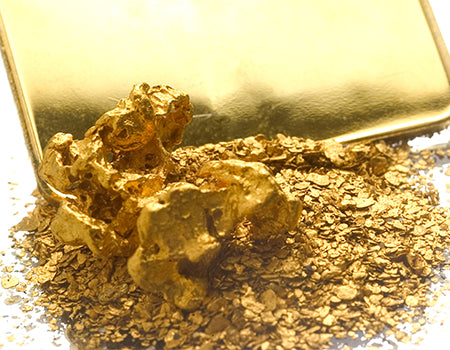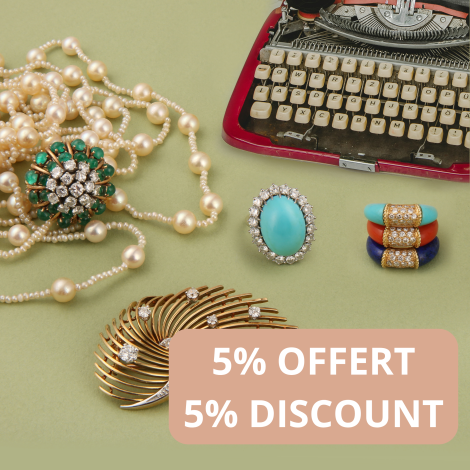Ethical jewellery: combining aesthetics and ecological responsibility

In a world where ethics and eco-responsibility are becoming essential, choosing ethical jewellery is a powerful statement. At Les Pierres de Julie Paris, we offer vintage jewellery that combines elegance with respect for the environment. Each piece, whether antique jewellery or modern creations, is carefully selected to meet the highest ethical standards. Discover how the free expertise of our gemmologists guarantees jewellery that matches your values, while preserving the treasures of the past.
The advantages of ethical jewellery
- Respect for the environment: Reduced environmental impact through the use of recycled materials and responsible extraction practices.
- Unique pieces: Possibility to personalise your jewellery, whether new or recycled, to create unique pieces.
- Traceability: Total transparency on the origin of the materials used, thus ensuring an ethical approach.
- Preservation of heritage: Preservation of the sentimental and historical value of antique jewellery by giving it a new lease of life.
Where to Find Ethical Jewellery in Paris ?

Les Pierres de Julie : The Go-To Address for Ethical Jewellery in Paris
In the heart of Paris's 15th arrondissement, just a stone's throw from the Esplanade des Invalides, Les Pierres de Julie stands out for its commitment to ethical and responsible practices. Whether you are looking to purchase antique jewellery, have a family heirloom valued, or create a unique new piece from recycled materials, our boutique welcomes you with renowned expertise and personalised service.
Visit Our Shop in the Village Suisse
Our shop, located in the Village Suisse, an iconic location for antiques and art in Paris, reflects our passion for ethical jewellery. Each visit is an invitation to discover rare and authentic treasures, carefully selected for their history and quality. Whether you are looking for a unique gift or a piece of jewellery for a special occasion, our team is here to advise and assist you.
Exchanging your jewellery : An alternative
Have you spotted a piece of jewellery on our website or in our shop window that you like, but your budget won't allow you to buy it right now? If you have gold or jewellery that you no longer wear, you can trade it in! After a free appraisal, we will offer you an equivalent exchange from our catalogue. It's a great opportunity to give your old jewellery a new lease of life... while treating yourself at the same time !
Treat yourself with your broken or badly damaged gold jewellery! Even a few grams of 18-carat gold can help you finance part of the jewellery of your dreams !
Supplier Selection : A Guarantee of Quality and Ethics
At Les Pierres de Julie, we carefully select our suppliers, ensuring that they share our values in terms of ethics and environmental responsibility. We prioritise partnerships with local artisans and certified mines in order to offer you jewellery that respects both workers and the planet. This attention to detail allows us to guarantee you jewellery of exceptional quality that aligns with your values.
Vintage Jewellery : An Ethical and Aesthetic Alternative
Bringing Treasures of the Past Back to Life
Vintage and antique jewellery is an excellent way to combine aesthetics with environmental responsibility. By choosing these pieces, you are contributing to the recycling of precious objects, thereby avoiding the extraction of new raw materials. At Les Pierres de Julie, each piece of vintage jewellery is carefully selected for its history and timeless beauty, allowing you to wear a piece of history while making a responsible choice.
Free Expertise : A Guarantee of Trust
When it comes to estimating the value of your family heirlooms or old jewellery, it is essential to consult qualified experts. At Les Pierres de Julie, we offer a free valuation of your jewellery in Paris. Our certified gemmologists assess each piece with the utmost precision, offering you complete transparency on the value and history of your treasures.
How to Recycle Your Jewellery and Precious Stones
Do you have necklaces, rings or bracelets lying around in a drawer? Whether they are sentimental heirlooms or damaged or worn jewellery, you don't want to throw them away but don't know what to do with them. If you no longer wear them, consider recycling them !
Give Your Jewellery a Whole New Life
In addition to offering ethical jewellery, Les Pierres de Julie gives you the opportunity to recycle your old jewellery to breathe new life into outdated or damaged pieces. Les Pierres de Julie can assist you with this process. From gold to gemstones, nothing is lost : everything is transformed.
In our Parisian workshop, we transform your old jewellery into modern and unique creations. Whether it's an engagement ring, a necklace or earrings, each piece is carefully reworked to suit your tastes and desires.
Julie Mialet will be your dedicated contact to help you create a unique piece or make alterations, because designing personalised jewellery is an intimate relationship between the material and the customer. We will begin by providing a free appraisal to evaluate your treasures, after which we can consider modern designs to showcase your stones and used jewellery.
Your jewellery will come to life thanks to the work of meticulous goldsmiths and will go through various stages: from choosing the stone to designing, wax modelling, casting, setting and polishing !
Do not hesitate any longer, do not let your old jewellery tarnish in your cupboards, wear it in a new way !

Les Pierres de Julie accompanies you from the initial design to the finished piece of jewellery.
But let's hear from our customers, because ultimately they are the ones who can best describe their experience :
«Un petit mot pour remercier Julie des pierres de Julie car grâce à ses talents j’ai pu ” sauver ” la bague de ma mère en adaptant une monture plus au goût du jour. La monture était vieillotte et vraiment pas à mon goût, elle a réussi à transformer cette bague et à en actualiser le style. Je la porte quotidiennement et je remercie encore Julie pour cette merveilleuse transformation.» - Annie Z. Paris
«J’avais de très belles boucles d'oreilles mais je ne pouvais pas les porter. Je suis retournée chez Pierres de Julie qui les a transformées et grâce à sa créativité, a son talent et une très belle chaîne, j’ai maintenant un magnifique sautoir !!!! Merci Julie» - Corinne, Neuilly-sur-Seine
«Vous pouvez y aller les yeux fermés. Julie est juste au top 😊. Ayant héritée des bagues de mes grands parents et arrières grands-mères je voulais une belle bague qui me ressemble tout en gardant l'or et les pierres des bagues dont j'ai hérité. Et le résultat est au-dessus de mes attentes encore mille merci à Julie j'ai une magnifique et unique bague qui me correspond parfaitement ☺😃.» - Marie C. Paris
«C'est un bonheur de venir chez Julie qui est une créatrice extraordinaire, très attentionnée et à l écoute de vos envies. À partir d une pierre offerte par mes parents elle a créé une bague sublime, très originale et en même temps classique. C est la deuxième bague qui vient de Julie et à chaque fois j ai plein de compliments. Merci Julie je suis super contente et merci pour votre gentillesse» Clothilde M. Paris
«Merci à Julie de m’avoir expertisé gracieusement des bijoux de famille. J’en ai profité pour faire remonter une broche de mon arrière grand-mère et j ai été ravie du résultat. Je recommande cette adresse !» Marie- Christine M. Paris
Recycling Precious Stones : A Sustainable Act
Precious stones, like metals, can also be recycled. Gemstone recutting can restore their sparkle and modernity while preserving their sentimental value. If you have inherited a precious stone that no longer meets current standards, do not hesitate to have it appraised. At Les Pierres de Julie, we offer appraisal and recutting services to bring these gems back to life.
Furthermore, many of you returning from your travels with lovingly collected gems wonder how to showcase them and have them set in jewellery. Garnets, beryls, quartz, emeralds, sapphires, diamonds, tourmalines... We can also offer you a unique creation, a souvenir of a trip that you wish to remember.
Using the same process as for recycled jewellery, Julie Mialet offers you a private consultation to design a new piece of jewellery that suits you: ring, brooch, necklace, bracelet or earrings, Julie will guide you in finding the ideal design for your stone.
Whether as a precious keepsake or a unique gift, your stones, enhanced by a beautiful setting, are sure to please everyone.
Why Choose Ethical Jewellery ?
Choosing ethical jewellery is much more than just a trend: it is a commitment to the environment and respect for human rights. Ethical jewellery, whether made from recycled old jewellery or certified materials, offers a sustainable and responsible alternative to traditional jewellery.
The Environmental Impact of Traditional Jewellery
The traditional mining industry, particularly for gold and precious stones, is often synonymous with pollution and ecological devastation. The extraction of these raw materials requires enormous quantities of water and the use of toxic chemicals such as cyanide and mercury. These substances, released into the environment without precautions, contaminate the soil, air and waterways, causing irreparable damage to surrounding ecosystems.

The Human Consequences : An Often Overlooked Reality
Beyond the environmental impact, working conditions in mines are often deplorable. Many miners, sometimes even children, work in dangerous conditions and are poorly paid. Ethical jewellery, on the other hand, is manufactured with respect for human rights, guaranteeing decent working conditions and fair wages.
Why Choose Recycled Gold ?


Gold : A Precious Resource that is 99.9% Recyclable
Gold is one of the few precious materials that can be recycled almost indefinitely. Using recycled gold in jewellery design not only reduces environmental impact, but also creates a virtuous production cycle. At Les Pierres de Julie, we prioritise the use of recycled gold in our designs, ensuring that our jewellery is both ethical and sustainable.
The Benefits of Fairmined Gold
In addition to recycling, choosing Fairmined gold is another way to ensure that your jewellery is ethical. This label ensures that the gold comes from artisanal mines that comply with strict standards in terms of environmental protection and working conditions. By choosing jewellery made with Fairmined gold, you are supporting local mining communities and participating in fair trade.
Choosing ethical jewellery is much more than just a fashion choice: it is a commitment to a more respectful and sustainable future. At Les Pierres de Julie, we support you in this endeavour by offering vintage jewellery in Paris, customised creations and free expertise to value your treasures. Take another step towards responsible luxury and explore the world of ethical jewellery. Be sure to come back to discover how even more innovative practices can transform the world of jewellery. Pierres de Julie welcomes you to its boutique nestled in the heart of Paris, at the Village Suisse, a stone's throw from the military school and the Esplanade des Invalides.
Nouveautés
- 2.900 €
- 2.900 €
- Unit price
- / per
- 2.400 €
- 2.400 €
- Unit price
- / per
- 3.800 €
- 3.800 €
- Unit price
- / per
- 2.800 €
- 2.800 €
- Unit price
- / per











